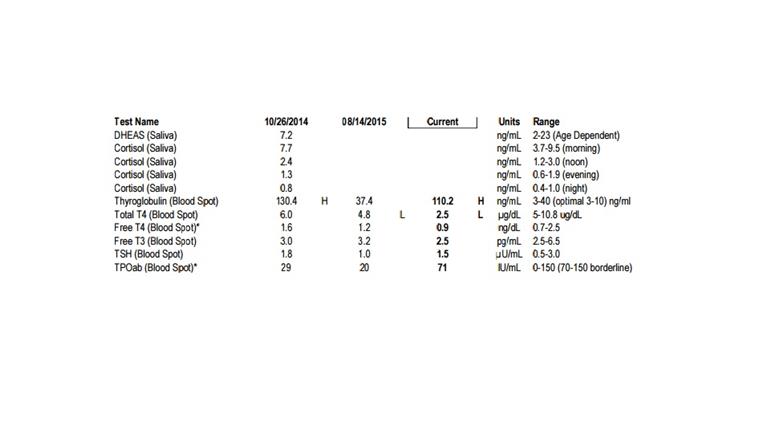Now I am borderline for Hashimoto based on TPOab, my TT4 keeps dropping which means I am not producing enough to make T4 and T3, only TSH remains normal. Between these tests on January 2015 I had blood taken on local private clinic when my TSH was 2.3 same range, T4 17(range 10-21) and T3 5.9 (range 3-6.5)
My selenium is now optimal, been taking brazil nuts. Iodine remains on the low side, but that I cannot fix as I cannot tolerate high amount of iodine, but I do supplement some and try to eat food naturally high on iodine. Iodine is actually the same than last time after high supplementation. Mercury slightly elevated but in the middle of the range so doesnt indicate mercury would be the reason. But this time for some reason arsenic and bromine were high, which just cannot understand.
Plus I have been avoiding any goitogrenic food even the millet I do eat for months before this test, yet my TPOab is now rising, been using quite a lot of dairy.
THIS IS FROM THE LABNOTE :
Thyroglobulin is very high. In the normal thyroid gland an elevated blood thyroglobulin (> 10 ng/ml) is considered a good marker
for iodine deficiency over the past weeks or longer. When iodine has been sufficient for thyroid hormone synthesis thyroglobulin levels are usually in the range of 3-10 ng/ml. However, in the abnormal thyroid gland, elevated blood thyroglobulin levels can indicate Grave's disease (hyperthyroidism), Hashimoto's thyroiditis, goiter, or, rarely, thyroid cancer (anvita.info/wiki/Thyroglobu.... Elevated thyroglobulin, in concert with elevated TSH and depressed total T4, may also occur with prolonged and excessive iodine supplementation, which can suppress thyroid hormone synthesis (Wolff-Chaikoff effect). With excessive iodine supplementation, elevated TSH and depressed total T4 are less likely to occur with concommitant thyroid therapy. More extensive evaluation of the thyroid may be worth considering.
Total T4 is lower than observed range. Total T4 is a good marker of the thyroid glands ability to synthesize thyroid hormones. A
low total T4 could be caused by one or more of the following: T3 therapy (e.g. Cytomel), Hashimoto's thyroditis, low iodine, low iodine uptake (caused by goitrogens), poor iodination of thyroglobulin (caused by goitrogenic inhibition of thyroid peroxidase iodination of thyroglobulin, low catalytic activity of thyroid peroxidase from low iron), and/or overall inhibition of thyroid hormone synthesis caused by excessive iodine supplementation (Wolff-Chaikoff Effect). The low total T4 is associated with symptoms of thyroid deficiency. Consider thyroid hormone therapy or increasing dosage if already taking.
Free T4 and free T3 are low-normal range, consistent with symptoms of thyroid deficiency. TSH is within normal range and not
reflective of the lower T3 and T4, which can be caused by impaired feedback response to the pituitary. This often is caused by high stress and associated high cortisol or catecholamines (norepinephrine), which suppress the hypothalamic/pituitary production of TSH and decreases hepatic conversion of T4 to T3. Chronic high stress/cortisol also directs hepatic conversion of T4 to bio-inert reverse T3. Thyroid therapy with T4 alone, and in many cases combination T4/T3 therapy often are not effective when stress/cortisol is high due to excessive conversion of T4 to reverse T3, which impedes the cellular actions of bioactive T3.
Consider replacement with a thyroid medication that contains both T4 and T3, or T3 alone (slow release). In addition, saliva
testing for cortisol, minimally am and pm testing but preferentially 4x throughout the day, is STRONGLY recommended prior to commencing thyroid therapy since normal cortisol levels are essential for normal tissue response to T3. For an excellent review explaining the interplay of stress/cortisol on thyroid function please see the following: endotext.org/adrenal.
Thyroid peroxidase (TPO) antibodies are borderline positive, suggesting a possible evolving issue with Hashimoto's autoimmune
thyroiditis. If symptoms of thyroid dysfunction become more problematic it would be worthwhile to recheck TPO levels. Antibodies to this enzyme may cause an increase in autoimmune dysfunction around the thyroid causing an increase in inflammatory cytokines, increased T cells, and NK cell function. The autoimmune reaction to the thyroid tissue results in destruction of the thyroid cells with consequent release of high levels of thyroid hormones (T4 and to a lesser extent T3), which results in a hyperthyroid state. Continued destruction of the thyroid gland results in fibrosis and eventual depletion of the thyroid hormone, thus causing a hypothyroid state. Clinical studies show that selenium supplementation is helpful in decreasing TPO antibody levels and thus helps prevent autoimmune destruction of the thyroid gland (Duntas et al. Eur J Endocrinology 148: 389-393, 2003)
My note : I have not had symptoms of high or low cortisol for long time. Possible tho that they have been rather slightly elevated during this spring as I have had stressful time and been getting flu all the time.
So the specialist reviewing my results recommends either combination therapy or T3 only, but what do I do know? Where to go, what does this mean?
PS the hyper super special endo I saw said IT IS DEFINITELY NOT thyroid issue nor Hashimoto, never ever.


 I am just having very skeptic moment. It is still very hard for me to believe that for example low T3 can have such an impact for one's life.
I am just having very skeptic moment. It is still very hard for me to believe that for example low T3 can have such an impact for one's life.